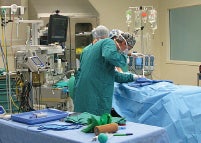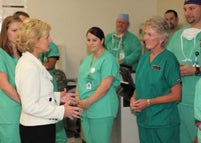Welcome Future Pirate Nurse Anesthetists!
About the Nurse Anesthesia Program
The nurse anesthesia program began as a 28-month course of study designed to prepare professional nurses as practitioners of nurse anesthesia eligible for national certification. In May 2019 it transitioned to a 36-month DNP program. Applications to the program are accepted throughout the year (Applications close September 1st each year, and interviews take place in fall semester) for class beginning the following May.
Our Mission
The mission of the nurse anesthesia program is to provide the students a clinical and didactic curriculum which enables them to meet graduation requirements of this program and to take the National Certification Exam so they can practice as CRNAs.
Our Philosophy
The Nurse Anesthesia Program subscribes to:
- the mission, vision, and values of the ECU College of Nursing
- the college’s DNP program objectives
- Nurse Anesthesia DNP program objectives
Additionally, in meeting our mission the nurse anesthesia program accepts the following beliefs:
- Human beings are individuals with needs, values, worth, and dignity.Although many human responses may be generalized and are predictable, all humans are unique and constantly interact with the environment in efforts to achieve a balance between their own unique needs and those of society. Adaptation is a process of seeking a maximum level of human functioning. Nurse anesthetists assist patient’s physical and psychosocial adaptation to the anesthesia environment.
- Society is comprised of individuals, families, groups, and communities that possess dynamic structure, values, and beliefs which influence individual and group behavior.Society is comprised of individuals, families, groups, and communities that possess dynamic structure, values, and beliefs which influence individual and group behavior.
- Health refers to an individual’s level of mental and physical functioning on a wellness-illness continuum, not merely the absence of disease. Health is influenced by developmental stages, by social and cultural factors, by previous experiences and self-expectations, and by personal choices about lifestyle and values. We believe access to health care is a human right.
- Nursing, as a discipline and a practice profession, is at once an art and a science concerned with human response to illness or potential health problems.Nursing involves caring for and about people. The goal of nursing is to assist individuals, families, groups, and communities to promote, attain, and maintain health or assure peaceful death through collaboration among clients, professional nurses, and other health care providers. Nurses are accountable to the clients they serve and are responsible for advancing nursing knowledge, critical thinking, theory, research, and lifelong inquiry.
- Learning is a dynamic internal process through which individuals develop their knowledge, skills and attitudes.Learning is a lifelong process evidenced by growth and sustained change in behavior. Learners vary in their past experiences, learning patterns, cognitive structures, motivation, interests, and life goals. Learning is facilitated by the learner’s active participation in the planning, implementation, and evaluation of their own learning experiences. Faculty in the nurse anesthesia program is dedicated to the educational development of nurses in the specialty of nurse anesthesia.
Graduates of the program are clinical scholars who integrate the science and art of nursing as well as articulate nursing’s unique contribution in a dynamic health care environment. We believe that graduate education challenges students to think creatively in order to develop visionary alternatives appropriate to health care.
Spotlight
Learn about our state-of-the-art Simulation Center
You Are Invited
News
Statistics
Since its inception in 2003, the ECU nurse anesthesia program has an overall 4% attrition rate, as well as a 94.4% first-time pass rate on the National Certification Exam (NCE). 100% of graduates practicing as CRNAs.
Class of 2024:
- 0% attrition rate (0/12 students)
- 100% first-time NCE pass Rate (12/12)
- 100% employed as Nurse Anesthetists within 6 months (12/12)
Class of 2023:
- 8% attrition rate (1/12 students)
- 91% first-time NCE pass rate (10/11)
- 100% NCE Passed (11/11)
- 100% employed as Nurse Anesthetists within 6 months (11/11)
Class of 2022:
- 0% attrition rate (0/12 students)
- 92% first-time NCE pass rate (11/12)
- 100% NCE Passed (12/12)
- 100% employed as Nurse Anesthetists within 6 months (12/12)
Class of 2021:
- 0% attrition rate (0/12 students)
- 100% first-time NCE pass rate (12/12)
- 100% NCE Passed (12/12)
- 100% employed as Nurse Anesthetists within 6 months (12/12)
Class of 2020:
- 0% attrition rate (0/12 students)
- 100% first-time NCE pass rate (12/12)
- 100% NCE Passed (12/12)
- 100% employed as Nurse Anesthetists within 6 months (12/12)
Class of 2019:
- 0% attrition rate (0/12 students)
- 84% first-time NCE pass rate (10/12)
- 100% NCE Passed (12/12)
- 100% employed as Nurse Anesthetists within 6 months (12/12)
Class of 2018:
- 0% attrition rate (0/12 students)
- 100% first-time NCE pass rate (12/12)
- 100% employed as Nurse Anesthetists within 6 months (12/12)
Class of 2017:
- 8% attrition rate (1/12 students)
- 100% first-time NCE pass rate (11/11)
- 100% employed as Nurse Anesthetists within 6 months (11/11)
Class of 2016:
- 0% attrition rate (0/12 students)
- 100% first-time NCE pass rate (12/12)
- 100% employed as Nurse Anesthetists within 6 months (12/12)
Class of 2015:
- 0% attrition rate (0/12 students)
- 83.3% first-time NCE pass rate (10/12)
- 100% employed as Nurse Anesthetists within 6 months (12/12)
Class of 2014:
- 9% attrition rate (1/11 students)
- 100% first-time NCE pass rate (10/10)
- 100% employed as Nurse Anesthetists within 6 months (10/10)
Class of 2013:
- 17% attrition rate (2/12)
- 100% first-time NCE pass rate (10/10)
- 100% employed as Nurse Anesthetists within 6 months (10/10)
Class of 2012:
- 0% attrition rate (0/12)
- 100% first-time NCE pass rate (12/12)
- 100% employed as Nurse Anesthetists within 6 months (12/12)
Congratulations CRNA Pirates!
Accreditation
The ECU nurse anesthesia program was developed and initially accredited in 2003. In October 2006, and again in November of 2016 the program received a 10-year accreditation from the Council on Accreditation of Nurse Anesthesia Educational Programs(COA).
The Program’s next review by the COA is scheduled for May 2026.
Council on Accreditation of Nurse Anesthesia Educational Programs (COA)
10275 W. Higgins Rd., Suite 906, Rosemont, IL 60018-5603
(224) 275-9130
The Council on Accreditation is a specialized accrediting body recognized by both the United States Department of Education and Council for Higher Education Accreditation (CHEA).
 Curricular Integration
Curricular Integration 